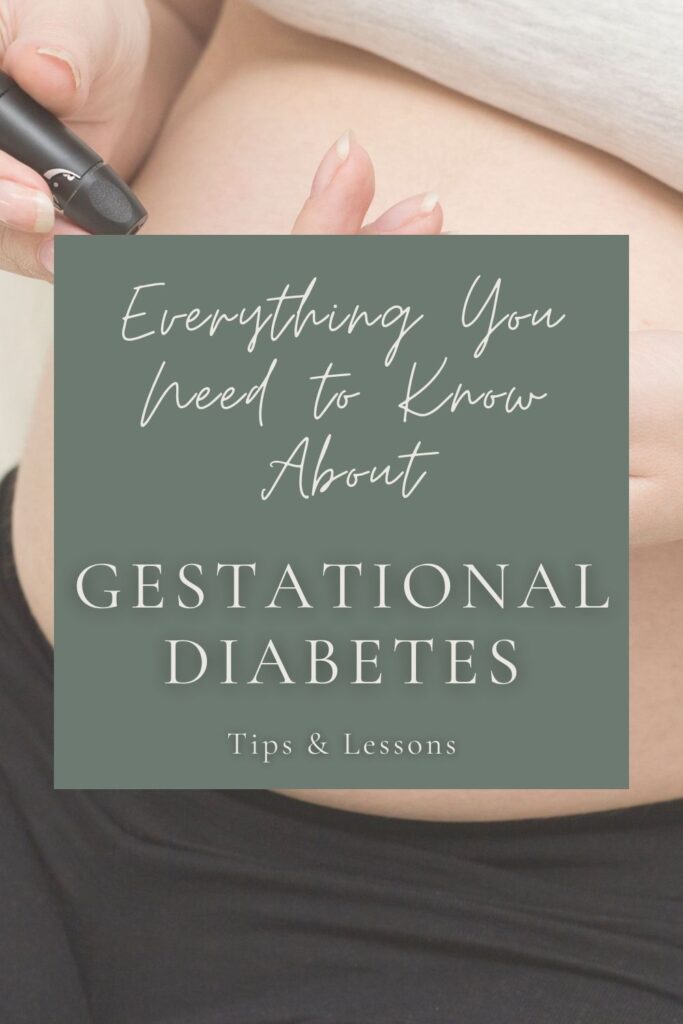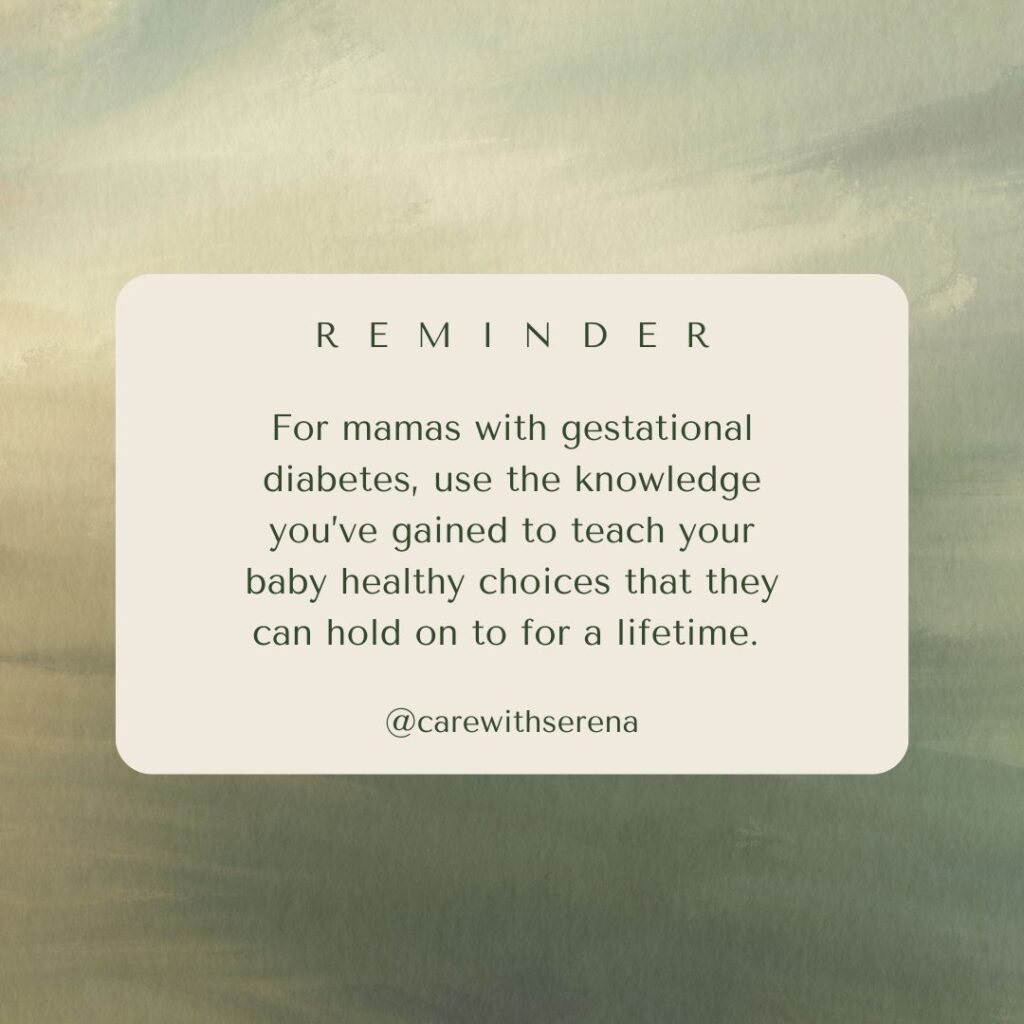Gestational Diabetes: How to Take Control of Your Health
What if I told you that you’re not the cause of your gestational diabetes? Would you believe me?
As your healthcare provider should have told you, you’ll eventually be screened for gestational diabetes around the 24-28 weeks mark of your pregnancy.
Or, perhaps you already have the diagnosis.
Either way, I’m sure you have lots of questions about the condition that you may not have asked your provider about.
In this article, I’ll briefly touch on what gestational diabetes is and what causes it.
I’ll talk about my experience with gestational diabetes and leave you with some takeaways that will make you feel empowered and inspired to make healthier choices during and after pregnancy.
Ready?

This post may contain affiliate links, which means I may receive a commission, at no extra cost to you, if you make a purchase through a link. Please see my full disclaimer for further information.
What is Gestational Diabetes?
Gestational diabetes is a type of diabetes that occurs in pregnancy.
When you consume sugar, the pancreas releases insulin which in turn breaks down the sugar.
However, sometimes, in pregnancy our bodies don’t release enough insulin, causing our sugar to spike up.
This can have negative consequences on you, including an increased risk of Type 2 diabetes, high blood pressure during pregnancy, and a higher chance of a C-section.
However, sometimes, our bodies don’t release enough insulin in pregnancy, causing our sugar to spike up.
When left untreated, gestational diabetes can cause complications for your baby as well.
Your baby is at a higher risk of obesity and Type 2 diabetes later in life; more likely to be born preterm; more likely to be born 9lbs or higher; at risk of breathing problems and low blood sugar; and, in rare situations, can pass away shortly before or after being born.
Your healthcare providers consider your pregnancy as high-risk when you’re diagnosed with gestational diabetes and you have to give birth at a hospital rather than at home or a birthing centre if you’re prescribed insulin.
What Causes Gestational Diabetes?
There isn’t a particular reason that some pregnant women get gestational diabetes over others.
Really, gestational diabetes is a result of the changing hormones in our pregnant bodies and some of us get stuck with lower insulin and a body that can’t keep up with blood sugar levels.
There are some risk factors, but even without these risk factors, women can still get a gestational diabetes diagnosis.
Here are some of the risk factors:
- Pre-existing diagnosis of diabetes
- Previous pregnancy with gestational diabetes
- Overweight or obese
- Family history of diabetes
- Lack of exercise
Again, if you do have a gestational diabetes diagnosis, I want to stress that you are not the cause.
Though you can make some changes to your diet and exercise to try to prevent gestational diabetes, sometimes genetics or hormone changes trump all of that effort.
Keep in mind that about 10% of expecting women end up with gestational diabetes.
Need support in your pregnancy journey? Check out my FREE pregnancy guide.
My Experience With Gestational Diabetes
When I found out I had gestational diabetes, I was devastated.
I was so worried about my health and the health of my baby and was overwhelmed by all the changes that had to be made to my pregnancy.
No kidding, I literally cried for a whole week at work and home.
I blamed myself for being overweight and not being more mindful of the foods I was eating. I reprimanded myself for giving into my cravings.
Now, if you felt the same as me, your feelings are completely valid. Who’d have thought that you of all people would end up becoming high-risk?
Sure, these could’ve contributed but what most likely contributed to my diagnosis was my family history.
Interestingly, once I ate more balanced meals and took 10-15 minute walks a few times a day, my blood sugars were fine. Even household chores were a great way to exercise and lower my blood sugar levels after eating a meal.
However, I had to take insulin before bed because my blood sugar would go up overnight given the lack of food while sleeping.
You see, even with the changes to my health, my hormones were still all over the place.
Want to read more articles on pregnancy? Check out my other blog posts:
HOW TO STAY HEALTHY FOR A HAPPY PREGNANCY
WHAT TO EXPECT WHEN GOING INTO LABOUR: A NEW MOM'S GUIDE
THE VALUABLE LIFE LESSONS I LEARNED FROM PREGNANCY
How Does Pregnancy Change When You Have Gestational Diabetes?
When you have gestational diabetes, you have to log your blood sugars for the rest of the pregnancy.
You’ll also attend a class where a dietician teaches you about the different foods you can eat and foods you should avoid.
Your gestational diabetes team will ask you to log your sugars when you wake up and after breakfast, lunch, and dinner. They’ll want to see you weekly, biweekly, or however often they think necessary based on the severity of your diagnosis.
If you can’t manage your blood sugar through exercise and diet changes, your diabetes team will prescribe you insulin.
This made me even more upset.
When I was put on insulin to use before bed, my midwives could no longer see me and I had to switch to the care of an OB (if you have a midwife, they’ll still be able to attend your birth and take care of your baby after).
Your OB will want to induce you at 38 weeks to prevent your baby from gaining too much weight before coming out.
Taking insulin also resulted in more appointments, including weekly ultrasounds and non-stress tests. The third trimester is already hectic but is more hectic when on insulin.
The point of me sharing this with you is so you can anticipate what may happen if you have gestational diabetes.
Fortunately, my baby was born healthy. His blood sugar was a bit low so my midwife had to give him a bit of glucose when he came out.
From there, they had to prick his tiny feet every couple of hours to ensure his blood sugars stabilized during our stay at the hospital.
What I Learned From My Experience
My gestational diabetes journey taught me always to be prepared for the unexpected.
When I went in for my glucose test, I honestly didn’t think I would have the diagnosis. But really, I checked almost all the boxes for the risk factors.
I learned that I’m not invincible and that bad things can happen that are outside of my control - and this applies outside of pregnancy too.
I talk more about this in my article on life lessons I learned from pregnancy.

What My Experience With Gestational Diabetes Can Teach You
Gestational diabetes completely changed the ending of my pregnancy but I eventually made peace with it.
If you have the diagnosis, it might bring up some strong emotions for you, but again, don’t blame yourself.
You’re not a bad mom because your baby has been exposed to high blood sugars - such outcomes aren’t within your control.
Your baby will still be born healthy.
Here are some information I want you to walk away with:
1. Do your best to prevent gestational diabetes, but remember you can still get the diagnosis
It’s not always possible to prevent gestational diabetes but here are some ways you can try to avoid the diagnosis:
- Work on weight loss before getting pregnant
- Exercise daily during your pregnancy, this can include walking and household chores
- Maintain a balanced diet that includes fats, protein, and carbohydrates high in fibre
- Eat sugary foods in moderation
2. It can be difficult to adapt to having gestational diabetes
Imagine you have all these pregnancy cravings only to realize you can no longer have them.
It kind of sucks, right?
Having healthcare providers tell us that we have to make significant changes to our lifestyle immediately is hard to accept.
But you have to do it anyway.
If you have trouble figuring out what you can and cannot eat, don’t be afraid to talk to the dietician who’ll be a part of your care.
You can also find various gestational diabetes meal plans online. You can create some desserts you enjoy without using sugar.
3. If you have trouble emotionally coping with your diagnosis, seek some help
If you find yourself becoming emotionally charged after receiving your diagnosis, please do yourself a service and seek some help from a professional or get some social support.
When getting a diagnosis like gestational diabetes, it’s easy for some new moms to go straight to denial.
When you’re in denial, you usually end up doing nothing about the problem.
Instead, it would be best if you accepted the diagnosis.
Like I said earlier, it was really hard for me to accept I had gestational diabetes and cried A LOT.
However, rather than switch to a state of denial, I sought out other moms who had gestational diabetes so I could relate to and learn from them.
If you don’t know anyone who’s had gestational diabetes, I suggest you find online communities on Facebook or perhaps speak to a therapist if you have a hard time coping.
4. Make use of the knowledge you’ve gained after pregnancy as well
I spoke to my dad, who has Type 2 diabetes, and he told me “You know, a diabetic diet is one of the healthiest diets you can be on.”
I never thought about it that way, instead, I wined about not being able to eat what I wanted, when I wanted.
It’s true though. All that this condition needs, is a healthy, balanced diet. Instead of carbs full of sugar, you should eat carbs full of fibre.
So, try to change your mindset from a place of scarcity to a place of abundance. Meaning, be grateful for the knowledge you’ve gained from this diagnosis instead of wallowing in the lifestyle choices you’ve lost.
With this knowledge, you can make better choices for your health, and teach your baby healthy choices that they can hold on to for a lifetime.
There’s no doubt that going through gestational diabetes is hard.
But, at the end of the day, we need to do what we must to keep ourselves and our baby healthy, during pregnancy and beyond.
If you don’t have the diagnosis, focus on prevention as best you can. Though, remember, you’re not the cause of the condition - the diagnosis is largely outside of your control.
If you have gestational diabetes already, you can learn to adapt, cope, and empower yourself to make healthier choices.
If you have any questions you’d like to ask me about my experience with gestational diabetes, please feel free to leave a comment on this post or email me at info@carewithserena.com.

2 comments